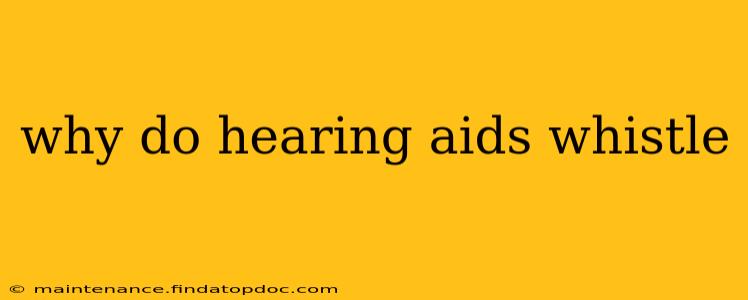Why Do Hearing Aids Whistle? Understanding Feedback and How to Prevent It
Hearing aids are remarkable devices that help millions regain their hearing, but occasionally, they produce an irritating high-pitched whistling sound, known as feedback. This is a common problem, and understanding its cause is the first step to solving it. This article will explore the reasons behind this whistling, offering solutions and preventative measures.
What Causes Hearing Aid Whistle?
The primary reason hearing aids whistle is a phenomenon called acoustic feedback. This occurs when sound from the hearing aid's speaker escapes and is picked up by the microphone. This sound is then amplified again, creating a loop of amplified sound that results in the characteristic whistling. Imagine a microphone placed too close to a speaker at a concert—that's essentially what's happening in the case of feedback with a hearing aid.
Several factors contribute to this feedback loop:
- Poor Fit: If the hearing aid doesn't fit snugly in your ear canal, sound can easily escape and be picked up by the microphone. This is a very common cause.
- Earwax Buildup: Wax obstructing the ear canal can create space for sound to leak out and cause feedback. Regular ear cleaning is crucial for hearing aid users.
- Damage to the Ear Canal: Any damage or irregularities in the ear canal can affect the seal and lead to feedback.
- Improperly Adjusted Volume: Setting the volume too high can increase the likelihood of feedback.
- Faulty Hearing Aid: In some cases, a malfunctioning hearing aid component can contribute to feedback.
- Incorrect Placement of the Earmold: The earmold needs to fit precisely to avoid sound leakage.
- Environmental Noise: Very loud environmental noises can sometimes trigger feedback.
Why is my hearing aid whistling suddenly?
A sudden onset of whistling could be due to a few factors:
- Changes in the Ear Canal: Slight changes in the shape or size of your ear canal, perhaps due to swelling or a build-up of earwax, can disrupt the seal and lead to feedback.
- Damage to the Hearing Aid: A small amount of damage or debris entering the hearing aid's components can cause malfunction and feedback.
- Changes in Environmental Conditions: Humidity and temperature fluctuations might slightly alter the ear canal environment, affecting the fit and causing whistling.
How can I stop my hearing aid from whistling?
Several solutions can address hearing aid feedback:
- Adjust the Volume: Try lowering the volume.
- Check for Obstructions: Make sure there is no earwax or debris obstructing the ear canal or the hearing aid itself.
- Ensure a Proper Fit: Visit your audiologist for a professional fitting and check for any issues with the earmold or the hearing aid's placement.
- Re-insertion: Sometimes, simply removing and reinserting the hearing aid can resolve minor fit issues.
- Try Different Ear Tips: Your audiologist might suggest different ear tips for a better fit.
- Feedback Management Systems: Modern hearing aids incorporate advanced technologies like feedback cancellation or directional microphones to minimize whistling.
Is whistling harmful to my hearing aid?
While whistling itself isn't directly harmful to the hearing aid, the underlying causes, such as improper fit or earwax buildup, might impact the longevity and performance of your device. Persistent feedback should always be addressed promptly by a hearing healthcare professional.
What should I do if my hearing aid continues to whistle?
If you've tried the above solutions and your hearing aid continues to whistle, it's crucial to consult your audiologist or hearing care professional. They can diagnose the problem accurately, make necessary adjustments, or replace the device if needed. Don't attempt to fix the problem yourself, as this could further damage the hearing aid.
By understanding the causes of hearing aid feedback and taking preventative measures, you can ensure a comfortable and effective hearing experience. Regular check-ups with your audiologist are essential for maintaining optimal hearing aid function and preventing problems like whistling.
